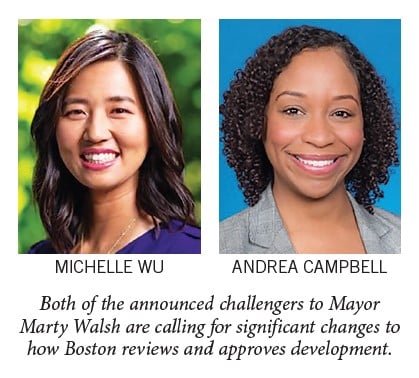During Mayor Marty Walsh’s tenure, Boston officials have approved a whopping 77 million square feet of real estate development – the equivalent of 64 Prudential Towers – including over 40,000 housing units and new lab buildings that could help the city challenge Cambridge as a life science industry powerhouse.
The two city councilors who have so far announced they’ll challenge Walsh for his seat next year say this track record masks widening inequities, leaving behind at-risk neighborhoods and discounting residents’ comments while approving developments. At-Large Councilor Michelle Wu and District 4 Councilor Andrea Campbell are mapping out reforms that they say would deliver on missed opportunities, including the disposition of city-owned properties to alleviate the housing crisis.
Wu seeks to dismantle the city’s existing development approval process–– split between the powerful Boston Planning & Development Agency and the zoning board of appeals – and create a citywide master plan that would reduce the need for variances. She cited the BPDA’s approval last month of the 10.5 million-square-foot Suffolk Downs redevelopment as a failed chance for the city to control the future of the site’s 109-acre Boston portion.
“Now that we’re at this point, we’re going to hold the developers to their promises for the civic infrastructure that is necessary to make this truly a new neighborhood,” Wu said.
Campbell stops short of supporting the nuclear option for the BPDA, while laying out a “community-based” approach to development that includes a heightened focus on disposition of city-owned properties in neighborhoods such as Mattapan and Roxbury. She wants the city’s Department of Neighborhood Development to seek developers and public uses for more than 100 city-owned properties in her district alone, replacing blighted vacant lots that attract crime with affordable housing or active civic space.
“I decided to focus on the city-owned parcels because there were so many that we could build on. It was shocking to me,” Campbell said. “And it was disappointing, because the process moved so slowly.”
A New BPDA, and Old Objections
Walsh has put his stamp on the former Boston Redevelopment Authority under the direction of Brian Golden, the former state representative from Brighton whom he picked to lead the agency after taking office in 2014.
Responding to the findings of an outside audit completed just months later, the agency updated record-keeping of the properties it owns and went after tenants behind on rent and developers in arrears on their affordable housing payments. The agency’s public web site was modernized with new functions making it easier to search for developers’ filings. This month, it launched a new online map of all BPDA-owned properties, including detailed assessors’ data, current uses and future development potential.
Revamping its public meeting format because of COVID-19, the agency has switched to virtual meetings that enable residents to comment remotely. A recent meeting on approval of the Suffolk Downs redevelopment stretched past midnight, as scores of residents weighed in via Zoom.
 A Different Approach to Development Review
A Different Approach to Development Review
Walsh’s challengers say the BPDA’s approach to approving development has changed little in recent years, and is muddied by the role of the Zoning Board of Appeals in approving variances that can conflict with the BPDA’s neighborhood planning initiatives. In September, BPDA directors voted to oppose an Amazon distribution center in South Boston, citing their Plan: Dot Ave. study which seeks to transform the industrial corridor with higher-density housing and commercial development.
A citywide master plan and rezoning, Wu said, would reduce the need for variances while adding a new layer of transparency for both residents and potential developers.
“Everybody is at the mercy of an uneven and inconsistent and very political process,” she said.
Campbell also cites transparency as a goal in calling for public forums about projects that can be built as-of-right under the existing zoning code.
“Regardless of the plans, folks want to be able to weigh in on every project that is coming into their community,” she said.
Campbell said she plans to resubmit legislation creating an independent inspector general at city hall to investigate municipal corruption, a proposal first launched in 2019 following the conviction of former BPDA employee John Lynch for accepting a $50,000 bribe from a developer.
Changes to Affordable Housing Minimums
Walsh’s pro-development stance has been most visible in his aggressive goal of completing 69,000 new housing units – including nearly 16,000 income restricted units – by 2030. Changes adopted in 2016 – the first in 16 years – to the city’s inclusionary development policy (IDP) increased fees for developers that don’t include on-site affordable units.

Steve Adams
Wu downplayed the role of the IDP as a cure-all for housing affordability, saying the city should do more to encourage workforce housing for families who don’t meet income guidelines for IDP units.
Campbell said the IDP should be amended to give developers more flexibility to designate payments for projects in neighborhoods that have seen little new development in recent years, rather than in the same neighborhood under the current regulations.
“We could change the policy in such a way that developers that are building market-rate projects downtown take the funds and use it in other parts of the city,” she said. “Every neighborhood needs to share the responsibility. How do we get the resources into the other neighborhoods?”







